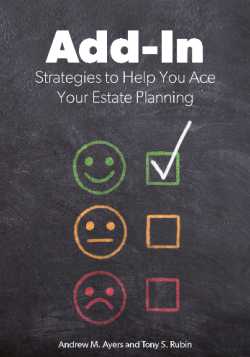 When it comes to thinking about the inheritance for your children, most people think of estate planning as what will happen with their legacy after they are gone. While this is the usual context that you should be thinking about, another question that often involves working with your financial advisor and your accountant is to what extent, if any, can you give your children an inheritance while you are still alive?
When it comes to thinking about the inheritance for your children, most people think of estate planning as what will happen with their legacy after they are gone. While this is the usual context that you should be thinking about, another question that often involves working with your financial advisor and your accountant is to what extent, if any, can you give your children an inheritance while you are still alive?
Especially in the case of married couples where one of the spouses has died, it may make sense for some items from your inheritance to be distributed immediately. So if you're working on your estate plan with an attorney, or you've already drafted one in the past and you want to do some early inheritances to your family, it's important to consider both the pros and the cons of early inheritances.
Pros of Giving Inheritance Early
If you're looking for some reasons to go with an early inheritance, I normally come across three main factors that weigh in favor of it.
- Immediate Impact: By giving your children their inheritance early, you can see the impact of your gifts on their lives. This can be particularly rewarding if the funds help them purchase a home, start a business, or provide better educational opportunities for your grandchildren.
- Tax Benefits: In many jurisdictions, gifting money before you pass away can reduce the estate tax burden since the gifted amount may no longer be considered part of your estate at death. This can result in significant tax savings, especially if you plan your gifts to align with tax-free gift allowances.
- Avoiding Probate: Assets distributed as part of an inheritance typically go through probate, which can be a lengthy and costly process. By distributing assets before death, you can avoid probate and ensure a smoother and faster transfer of assets to your beneficiaries. If you've been working with an attorney and your financial advisor, you have likely already limited the exposure of your assets to probate, but an early inheritance is another step towards avoiding leaving a probate court proceeding for your loved ones.
Cons of Giving Inheritance Early
As you can guess, if there were no reasons not to give an early inheritance, everyone would be doing it. However, there are plenty of reasons you should consider waiting and leaving the inheritance to your family after you have passed away.
- Financial Risk: If you give away a large portion of your assets, you might face financial insecurity later in life, especially if unexpected expenses arise, such as medical bills or long-term care needs.
- Family Dynamics: Distributing wealth early can lead to conflicts or jealousy among siblings, especially if not done equally or perceived as unfair. It’s crucial to communicate clearly and possibly involve all family members in discussions about early inheritance to mitigate misunderstandings and disputes.
- Loss of Control: Once you give away your assets, you lose control over them. This can be problematic if the assets are not used as you hoped or if the recipients face financial difficulties, such as divorce, bankruptcy, or lawsuits, which could jeopardize the gifted assets.
Which Should You Choose?
Seeing both the pros and cons above, it can be confusing as to which way you should be leaning (and, respectfully, making up your mind based on a blog is not usually the best course). So, instead of having your heart set on one or the other, it's a good idea to work with your professional advisors to figure out what makes the most sense for your family. If you're looking for a checklist to get started, here's how I would suggest you approach this issue:
- Plan Carefully: Consult with financial and legal advisors to understand the implications of early inheritance for your situation. Make a detailed plan that considers your long-term financial needs and the needs of your beneficiaries.
- Communicate: Discuss your plans with your children and any other family members who might be impacted. Transparency can prevent future conflicts and help everyone understand your intentions.
- Use Trusts: A trust can provide a structured way to manage and distribute assets before and after your death, offering protection and ensuring that the assets are used in the manner you intend.
Need Help with Your Inheritance?
If you don't already have an estate plan, or if you have one that needs to be updated to accommodate an early inheritance, let's schedule a Legal Strategy Session online or by calling my Edina, Minnesota office at (612) 294-6982 or my New York City office at (646) 847-3560. My office will be happy to find a convenient time for us to have a phone call to review the best options and next steps for you to work with an estate planning attorney to get your estate plan prepared.




